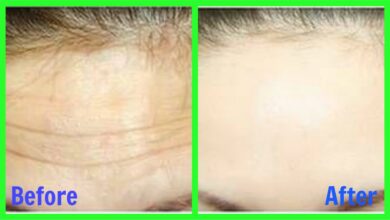Tartar control toothpaste contains chemical ingredients, such as pyrophosphates, zinc citrate, fluoride, etc. These ingredients prevent the build-up of tartar and have an anticaries effect on your teeth. Some tartar-control toothpaste is also found to contain an antibiotic called triclosan that is responsible for killing certain oral bacteria.
You Will Need
A tartar control toothpaste
What You Have To Do
Brush your teeth with a tartar control toothpaste.
How Often Should You Do This
Do this at least twice a day.
4. Baking Soda Mixture
Baking soda soothes the teeth and gums and exerts an antibacterial effect on plaque and tartar. This could help in preventing tartar and whitening your teeth.
You Will Need
- 1 tablespoon baking soda
- A pinch of salt
- Toothbrush
What You Have To Do
- Mix the baking soda and salt and scrub your teeth with this mixture using a toothbrush.
- Rinse your mouth with lukewarm water.
How Often You Should Do This
Use this every alternate day for quick results. Once the plaque is cleared, you can continue using this remedy once every 7-10 days.
5. Aloe Vera Gel
Aloe vera possesses antimicrobial properties and contains antioxidants that can fasten the healing of the gums by scavenging the free radicals produced by the bacteria. Lemon essential oil possesses antifungal properties against C. albicans,fungi that are found on our skin and certain parts of the body. This can help prevent tartar and caries.
You Will Need
- 1 teaspoon aloe vera gel
- 4 teaspoons vegetable glycerine
- 4-5 tablespoons baking soda
- 10 drops lemon essential oil
- 1 cup of water
What You Have To Do
- Mix all the ingredients to form a smooth paste.
- Scrub your teeth with this mixture.
- Rinse your mouth thoroughly to remove the paste.
How Often You Should Do This
Use it once in 3-4 days until the plaque is completely gone.
Note: Do not use this remedy for a long period as glycerine can interrupt the remineralization process of your teeth.
6. Sesame Seed Oil
Sesame oil is rich in bioactive compounds that exhibit antioxidant, detoxification, and antibiotic properties. It is traditionally used for oil pulling as it can reduce plaque-induced gingivitis and free radical injury that accompany dental caries.
You Will Need
- 1 tablespoon sesame seeds
- Toothbrush
What You Have To Do
- Swish the sesame seed oil in your mouth for 15 minutes.
- Rinse your mouth thoroughly.
How Often You Should Do This
Do this twice a week.
7. Floss Regularly
Flossing is an excellent way to remove plaque and food particles between the teeth. Flossing the teeth prevents the formation of tartar and helps you maintain good oral hygiene. Floss cleans not only between the teeth but also between the gums, thus keeping dental caries and gum diseases at bay.
You Will Need
Dental floss
What You Have To Do
- Insert a dental floss string between two teeth.
- Gently pull the string back and forth to extract food particles between your teeth.
- Insert it in the crevice of the gum to remove any remnants.
- Repeat until you cover the entire mouth.
How Often Should You Do This
Do this at least twice daily.
8. Antiseptic Oral Cleanser Or Peroxide Solution For Gargling
Both the mouthwash and hydrogen peroxide are antimicrobial. This solution helps to loosen and remove tartar.
You Will Need
- 1 tablespoon antiseptic mouthwash
- 3 tablespoons 3% hydrogen peroxide solution
What You Have To Do
- Mix the two ingredients and gargle with this solution for a minute or two.
- Follow this up by gargling with plain water.
How Often You Should Do This
Repeat this twice a week.
9. Use A Dental Pick
You can use a dental pick (available in stores) to remove hardened tartar from your teeth. It can help you scrape it out gently.
You Will Need
Dental pick
What You Have To Do
- With the help of a lighted magnifying mirror, locate the tartar accumulated on your teeth.
- Gently scrape out the tartar, spit, and rinse your mouth during the cleaning process.
How Often You Should Do This
Repeat this twice a day.
Note: This should be done with gentle care as picking deep into the gums may cause an infection.
10. Sanguinaria Extract
Bloodroot is a common ingredient in toothpaste as it is an antimicrobial agent and can reduce dental plaque levels. Hence, it could be used in reducing dental plaque and gingivitis.
You Will Need
- 3-4 drops sanguinaria extract (bloodroot)
- A cup of warm water
What You Have To Do
Add the bloodroot extract to the warm water and gargle with this mixture.
How Often You Should Do This
Use this mouthwash every day, preferably twice a day.
11. Oil Pulling
Oil pulling is done to get rid of plaque and similar infections. Coconut oil absorbs all impurities from your oral cavity. It also possesses antimicrobial properties that are effective against oral pathogens.
You Will Need
1-2 tablespoons virgin coconut oil
What You Have To Do
- Swish the oil around in your mouth for 10-15 minutes.
- Spit the oil out and rinse your mouth thoroughly with warm water.
How Often You Should Do This
Repeat this twice or thrice a week.
Once tartar is formed, it is difficult to remove it and prevent further build-up. These remedies might take a while to show results, but they will help in preventing tartar formation.
Here are a few more tips you can follow to prevent the formation of plaque and tartar on your teeth.
Prevention Tips
- Use a soft-bristled toothbrush to safeguard the enamel and facilitate the easy removal of plaque on the teeth.
- Avoid smoking as tobacco is responsible for the accumulation of tartar under the gum line.
- Avoid eating foods rich in starch or sugars as they promote bacterial growth in the mouth.
- Drink sufficient amount of water after each meal to wash out any food particles in the mouth.
- Consume plenty of vitamin C-rich fruits as they improve oral health and prevent gingival inflammation .
- Schedule periodic appointments with your dentist for general check-up and teeth cleaning.
It is very important to get rid of plaque and tartar before they can cause any more oral diseases. However, keep in mind that tartar can prove to be difficult to remove, depending on the intensity to which it has calcified. The best prevention is through proper oral care and brushing vigilantly and flossing regularly. If the problem persists, you must seek immediate medical help from your dentist.




